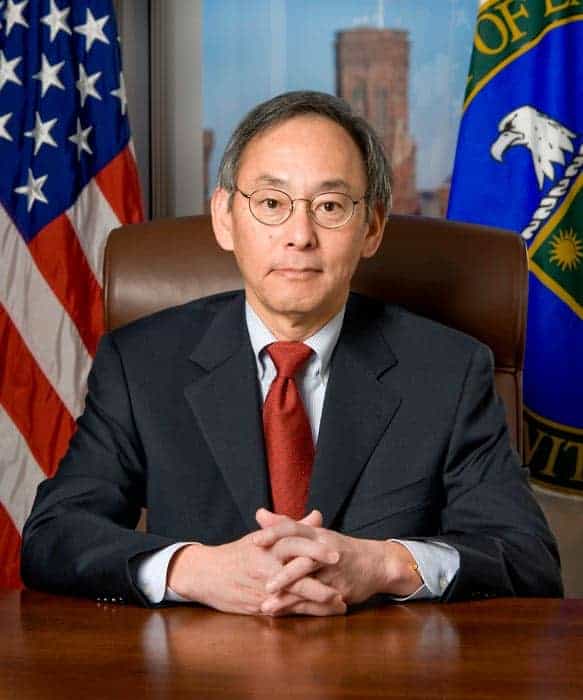
The Nobel laureate Steven Chu has announced he is to resign as US energy secretary. When Chu departs, most likely at the end of February, he will have served in the post for four years – longer than any of the 14 previous heads of the Department of Energy (DOE). Chu now plans to return to “an academic life of teaching and research” in California.
Politically independent, Chu received plaudits from Democrats and environmentalists during his time in office, which spanned the whole of US President Barack Obama’s first term in office beginning in 2008. “Steve helped my administration move America towards real energy independence,” Obama said in a statement. “Over the past four years we have doubled the use of renewable energy, reduced our dependence on foreign oil and put our country on a path to win the global race for clean-energy jobs.”
In a letter to DOE staff, Chu noted his successes in office, such as funding the Advanced Research Projects Agency-Energy (ARPA-E) – a programme to promote and fund research and development into advanced energy technologies. The agency’s work in areas such as improving batteries for electric vehicles and developing manufacturing technologies for solar cells has drawn plaudits across the board.
Chu also played a key role in overseeing efforts to cap the oil spill from BP’s Macondo well in the Gulf of Mexico, while the physicist’s “SunShot initiative” – an effort to increase US use of renewable-energy technologies – began progress towards a goal of reducing the cost of solar power to $1 per watt. “Secretary Chu has led the energy department at a time when our nation made the single largest investment ever in clean energy and doubled our use of renewables,” stated Gene Karpinski, president of the League of Conservation Voters.
In his stint as energy secretary, Chu also worked hard to break down the traditional walls between basic and applied science. “He had a substantial impact on changing research in the department, although mainly in terms of applied research,” Robert McKeown, deputy director for science at the Thomas Jefferson National Accelerator Facility, told physicsworld.com.
Facing the critics
Yet Chu also became a controversial figure, facing heavy criticism from Republicans, deniers of climate change and some members of the business community. Critics focused on occasional failures of Chu’s initiatives, such as Solyndra – a solar-cell manufacturer that went bankrupt after receiving $535m in DOE loan guarantees – as well as A-123 Systems, an innovative battery maker that went bust before being rescued by a Chinese conglomerate.
Daniel Kish, senior vice-president of the Institute for Energy Research, a Washington DC-based non-profit corporation, asserted that the emphasis on renewables has cost jobs. “The policies and priorities of Chu’s energy department have benefited our global competitors and intensified the economic pain felt by millions of unemployed Americans,” he says.
Chu responded to those criticisms in his letter to DOE’s employees. “The truth is that only 1% of the companies we funded went bankrupt,” he noted. “The test for America’s policy makers will be whether they are willing to accept a few failures in exchange for many successes.”
Early speculation on the Obama administration’s nomination of Chu’s successor focuses on former governors, including the Democrats Bill Ritter of Colorado, Jennifer Granholm of Michigan and Chris Gregoire of Washington state. Yet there is a possibility that Chu’s successor will be another scientist: theoretical physicist Ernest Moniz of the Massachusetts Institute of Technology, who served as undersecretary of energy for former US president Bill Clinton.



